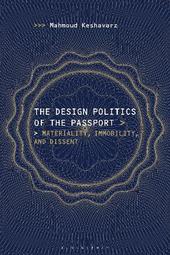
|
The Design Politics of the Passport: Materiality, Immobility, and Dissent
Hardback
Main Details
| Title |
The Design Politics of the Passport: Materiality, Immobility, and Dissent
|
| Authors and Contributors |
By (author) Mahmoud Keshavarz
|
| Physical Properties |
| Format:Hardback | | Pages:144 | | Dimensions(mm): Height 234,Width 156 |
|
| Category/Genre | Product design |
|---|
| ISBN/Barcode |
9781474289399
|
| Classifications | Dewey:323.67 |
|---|
| Audience | | Postgraduate, Research & Scholarly | |
|---|
| Illustrations |
10 BW illus
|
|
Publishing Details |
| Publisher |
Bloomsbury Publishing PLC
|
| Imprint |
Bloomsbury Visual Arts
|
| Publication Date |
13 December 2018 |
| Publication Country |
United Kingdom
|
Description
The Design Politics of the Passport presents an innovative study of the passport and its associated social, political and material practices as a means of uncovering the workings of 'design politics'. It traces the histories, technologies, power relations and contestations around this small but powerful artefact to establish a framework for understanding how design is always enmeshed in the political, and how politics can be understood in terms of material objects. Combining design studies with critical border studies, alongside ethnographic work among undocumented migrants, border transgressors and passport forgers, this book shows how a world made and designed as open and hospitable to some is strictly enclosed, confined and demarcated for many others - and how those affected by such injustices dissent from the immobilities imposed on them through the same capacity of design and artifice.
Author Biography
Mahmoud Keshavarz is a postdoctoral researcher at the Engaging Vulnerability Research Program, Department of Cultural Anthropology, Uppsala University, Sweden.
ReviewsKeshavarz makes a series of important points about postcoloniality, race, and gender in determining the privileges and prejudices intertwined in the act of travelling across borders. * Journal of Design History * Essential reading for those engaged in global design history and related fields such as politics and sociology ... Keshavarz is to be commended for an engaging and provocative book that succeeds in communicating historical and contemporary experiences of migration, as well as illuminating critical issues that are largely underrepresented in design history. * Journal of Design History * Mahmoud Keshavarz's original and evocative book, The Design Politics of the Passport, blasts conventional design studies out of the water, brilliantly exposing design's role in making a world that contains and controls certain subjects more than others. * Alison J. Clarke, Chair of Design History and Director of the Papanek Foundation at the University of Applied Arts, Vienna, Austria * In this provocative book, Mahmoud Keshavarz puts into question reigning notions of critical design, national identity, illegality, forgery, and much more. He does this by unravelling a seemingly mundane designed artefact: the passport, shifting attention from the design of passports to what passports design as they act in the world. As such, this is an exemplary study of ontological designing in action, and an important book for thinking the inter-relation of design and politics. The sharp theoretical analysis is grounded in, and enriched by, case studies of the effects of regimes of passporting on individual lives. The Design Politics of the Passport is timely in its address to the uneven distribution of rights of movement in a world where political, economic and climatic catastrophes are compelling increasing numbers of people to be on the move. * Anne-Marie Willis, Visiting Professor of Architecture at the University of Adelaide, Australia * In this exciting and conceptually ambitious study, Mahmoud Keshavarz gives new meaning and substance to such well established concepts as the production of space and the diagram of power. By examining with incisive care and precision the co-articulations of space and power through the artefact of the passport, this book's interrogation of the politics of design and the design of power offers a refreshing and path-breaking perspective on the materiality of bordering and im/mobiilty. * Nicholas De Genova, Professor and Chair of the Department of Comparative Cultural Studies, University of Houston, USA *
|